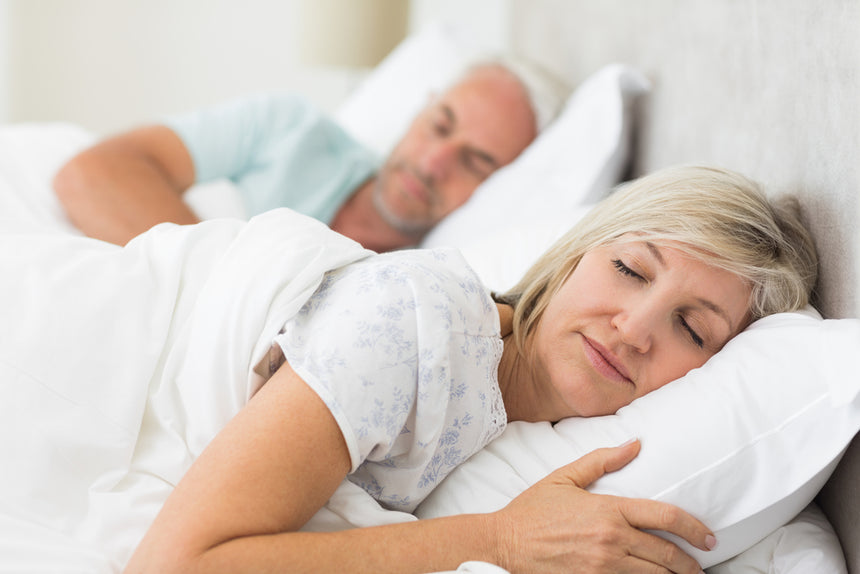The Science of Melatonin
Most of us have heard the word melatonin. It gets mentioned a lot in conversations about sleep. But other than knowing it has something to do with sleep, not many of us know what it actually is, what it does, or why it may be a beneficial supplement.
If you’ve ever struggled to fall or stay asleep, it’s beneficial for you to know how melatonin functions in your body and what you can do keep it at healthy levels. Here’s everything you need to know about melatonin, what it does, and why it’s important to your healthy sleeping habits.
What is Melatonin?
Melatonin is a hormone produced naturally in your body through the pineal gland. The gland is teeny tiny, and you can find it in the middle of the brain. The pineal gland is activated when the sun goes down. When the gland is activated, it produces melatonin.
One of the most important aspects of getting this hormone to release is darkness. When your retina (the layer of cells at the back of your eyeball responsible for transmitting signals to the brain) detects light, melatonin release is repressed. During the day, because there is so much light, there is little melatonin in the blood stream.
However, when your eyes detect darkness, they send a signal to the brain to release melatonin.
This surge in this hormone makes you feel sleepy. Melatonin also decreases your body temperature and respiration rate—important pieces of getting to and staying asleep.
High amounts of melatonin stay in your blood throughout the night. It begins to decrease when your eyes begin to detect the morning light. During the day, there’s almost no detectable melatonin in your bloodstream.
Melatonin and the Circadian Rhythm
Melatonin is sometimes called the “Dracula of hormones,” because it only comes out in darkness. It’s closely tied with the natural circadian rhythm of human beings. The body is “set up” to sleep during the night and be awake during the day.
Our circadian rhythm is controlled by the suprachiasmatic nucleus (SCN). The SCN is made of more than 20,000 neurons and is found in the hypothalamus. It’s the SCN that tells the pineal gland to produce or suppress melatonin. The SCN receives information from the eyes.
Maintaining regular sleep patterns, such as going to bed and waking up at similar times can keep this circadian rhythm functioning as it should.
The Problem with Light
Because melatonin release is so closely tied with light, it’s easy to trick the brain into thinking it’s still daytime. Melatonin is only released if the eyes see dim lighting. Even if the clock reads 10 p.m., bright light can keep the retina from signaling the brain to release melatonin.
This is the reason it’s more difficult to go to sleep in the summer than in the winter. In the summer, it can stay light until well after 9 p.m. So, even if you must get up early for a meeting the next morning, the sunlight is telling your brain to stay awake.
Mobile devices and computers also emit bright light. It’s technology that’s generally to blame for our collective sleep issues. According to the CDC, more than 1/3 of Americans don’t get enough sleep. The blue and green light from your technology can impact the release of melatonin.
If you’re working until late at night on a computer or your phone, there’s a good chance your eyes aren’t seeing enough darkness to tell your brain to start producing melatonin. Even if you get done working at a decent hour, it may take a couple hours for your eyes and your brain to start putting you to sleep.
Disrupting your circadian rhythms with bright light can be problematic to your health. Those who work night shifts and travel often are more likely to have irregular rhythms. Sleep disorders, mood disorders, even diabetes have been linked to irregular rhythms.
Train Your Rhythms
If you’ve been struggling with getting enough sleep, there are a few things you can do to help train your circadian rhythm to function more naturally. First, do yourself a favor by turning down the lights about two hours before you go to bed. If you’re watching television, sit at least six feet away from it. If possible, stop looking at computer screens or your phone about two hours before you go to bed.
By limiting light exposure, you give your body the best chance of putting itself to sleep naturally.
On the other hand, exposing yourself to sunlight during the day can help your body produce melatonin at night. If you work in a dark office or at home with the curtains closed most of the day, it would benefit you to take a walk outside 1-2 times per day, especially during the morning hours.
If you're one of those who struggle to wake up and feel energized in the morning, sitting by a sunny window while you enjoy your morning cup of coffee may help you feel less groggy in the morning.
Supplementing with Melatonin
Melatonin supplementation could aid in how well and quickly you get to sleep and stay asleep. If you’re looking to try supplements, make sure you check the label. Look for ones that have a clinically-studied dose—at least 1-3 mgs—and take it at the appropriate time.
It’s also important to know a melatonin supplement is not a complete fix for any sleep issues you may be having. It’s important for you to create healthy sleeping habits and continue to follow them. Create a good bedtime routine, switch off your technology, and spend some time in the dark!
